Continuing your education and the college application process is a stressful, yet exciting time! What isn’t so exciting is choosing the best way to apply to your future college. Traditionally, there are three ways to apply:
- early action
- early decision
- regular decision
Whether it is your junior year or senior year! You should be well on your way to the college application process. You may have a dream school or a first choice college. You may not know where to start with multiple colleges in mind. You may be wondering about early decision programs and if it is a smart move. You may wonder about admission rates and if regular applicants are considered adequate. What do most schools want? Will you get your top choice college? Does class rank matter?
School Early Decision (Early Action or Early Decision)
The major difference between EA vs. ED applications is that early action is a nonbinding agreement, while early decision is a binding agreement. If you apply early decision to a college and get in, your decision is accepted and you are expected to enroll.
Before worrying too much about which option to choose, check to see if your chosen university offers early application options. Some schools offer one or the other, while others offer both. Read on to learn more about early action vs. early decision college applications and which application is right for you!
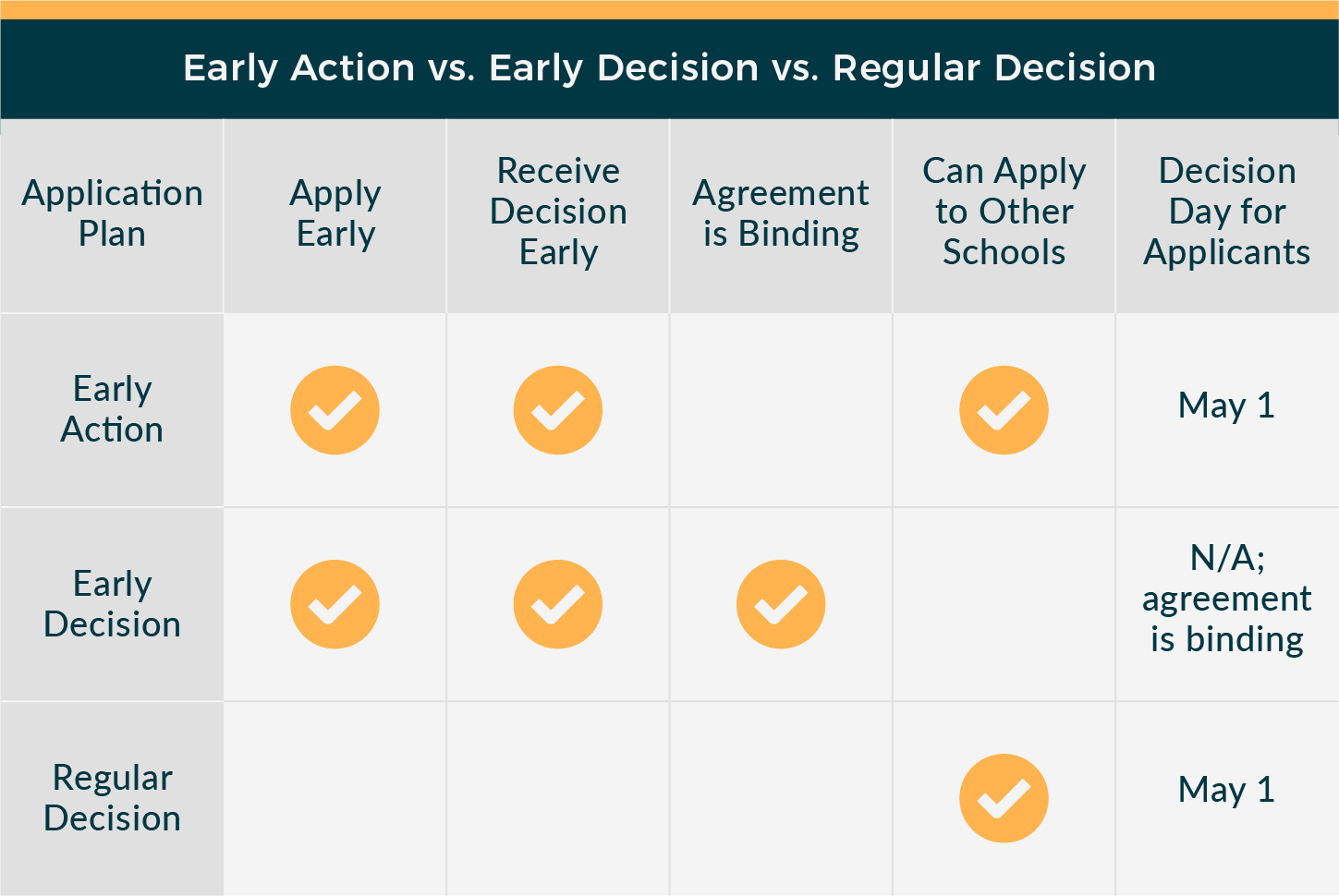
Do You Have a Better Chance of Getting Accepted If You Apply Early?
There is some speculation on whether or not applying early helps applicants get accepted. Some findings suggest applying early may help increase applicants‘ chances of acceptance.
In fact, the 2019 State of College Admission Report found that colleges saw higher acceptance rates for early admission applicants. This included both early action and early decision compared to regular decision applicants.
Of the schools that offered early action applications in 2019, the overall admission rate was:
- 64.1% for regular applications
- 73.6% for EA applications
For early decision applicants:
- 50.7% overall admission rate
- 62.3% for ED applications
There’s also another definite perk to getting your college application materials in early. College admissions officials prefer it. Applying early gives admissions officials more time to review applicants’ materials. They can evaluate the applicant pool for the year. Seeing what’s out there allows admissions officials to build a strong class for the coming year. It ensures that each student admitted early is the best possible fit.
Applying early also helps to set the tone for the admissions process for other applicants. Admissions officers see the general pattern of early admission applicants such as:
- grades
- extracurriculars
- GPA
They’ll want students who applied regular admission decision to meet this same criterion to ensure a well-rounded, uniform class.
What Is Early Action?

Early action applications are submitted and reviewed early to the college(s) of choice, but are not binding agreements to attend. Applicants can apply to any number of colleges via early action, as long as they make their final decision by May 1 of the year they’ll attend college.
What is single-choice early action (SCEA)?
SCEA means that you can apply early to only one private school. Harvard, Yale and Stanford offer SCEA. Early decision deadlines for applications are typically due in November. Decisions come through in December. Students have until May 1 to make a decision. If this is their top-choice school, SCEA may be a good option for them!
What is restrictive early action?
Restrictive early action is a way to show a school that it is your top priority. You are only applying early to this one school. You are not bound to attend this school if you are accepted.
Advantages of Applying Early Action
Since early action isn’t a binding decision, this is a great option for a number of reasons. One of the most important things to consider when applying early action is that you can apply to a number of schools through early decision plans.
1. Application Is Reviewed Early
As the name implies, one of the pros of applying early action is just that — getting your application in before others! This gives college admissions staff more time to carefully review your application and ensure you’re a perfect candidate to attend their university
2. More Time to Decide
Applying early means you’re reviewed early, and also receive your application decision early. Early action is not a binding agreement. If you’re accepted to a number of colleges that you applied to, you have more time to decide where you will ultimately go.
As such, you’ll also have more time to weigh your financial aid or scholarship options, as well as the ability to tour the campuses and hear from current students.
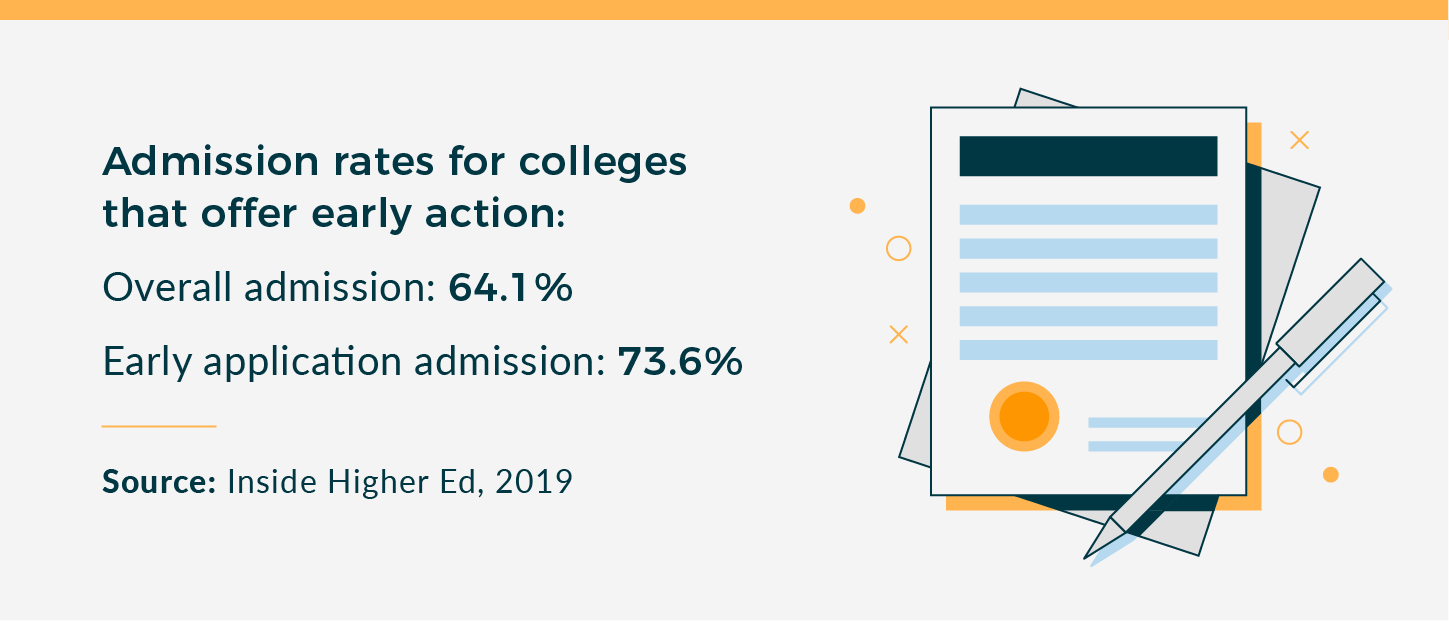
Disadvantages of Applying Early Action
Though most colleges prefer early applicants, early action does come with its fair share of disadvantages.
1. Less Application Time
As anyone who has applied to college will tell you, those applications take a lot of hard work, time and dedication. From essays to letters of recommendation, college applications have many moving parts to show colleges you’re the most well-rounded choice for their student body.
Though you have more time to decide where you’ll end up attending, having an earlier application deadline means less time to work on your application. With many colleges opening applications in August and early action being due mid-November, you’ll have to plan your application process wisely to make sure you get them all in on time.
2. Senioritis Hits Hard
Any high school or college senior will be the first to tell you that “senioritis,” or the performance and motivation drop that comes with the end of high school or college approaching, is a very real affliction that hits hard.
While having more time to decide on what college you’ll attend is beneficial, this could also lead to a reduced interest or performance on school work once you’re accepted.
Who Should Apply Early Action?
As with many other things, being early with your college application can only help you. There are a number of reasons to apply early — but students who are best matched to apply early action are those who:
- Have researched colleges and universities extensively
- Are sure of their first-choice colleges
- Match the college’s admissions profile in terms of grades, standardized test scores and academic performance
- Are compatible with the university both academically and socially
What Is Early Decision?

Applying early decision to college means, if you get in, you are agreeing to enroll at that university. Unlike early action, there’s no time to weigh your decisions and acceptances. This is a binding agreement between you and the university.
Because early decision is a binding agreement, many universities require that you rescind any other in-progress or submitted college applications once you’re accepted.
It’s recommended to only apply early decision if you have one college you really want to attend and would be attending, regardless of whether you applied early decision or not. Once you’ve made up your mind about applying early decision, you must decide on your timeline. Early decision applicants have two options to choose from when deciding when to send their applications in: early decision one (ED I) and early decision two (ED II).
Early Decision I vs. Early Decision II
Though there are two early decision timelines, the most popular and widely used is ED I which is used at most public and private universities as well as Ivy League institutions. ED II is mostly used at private, liberal arts colleges.
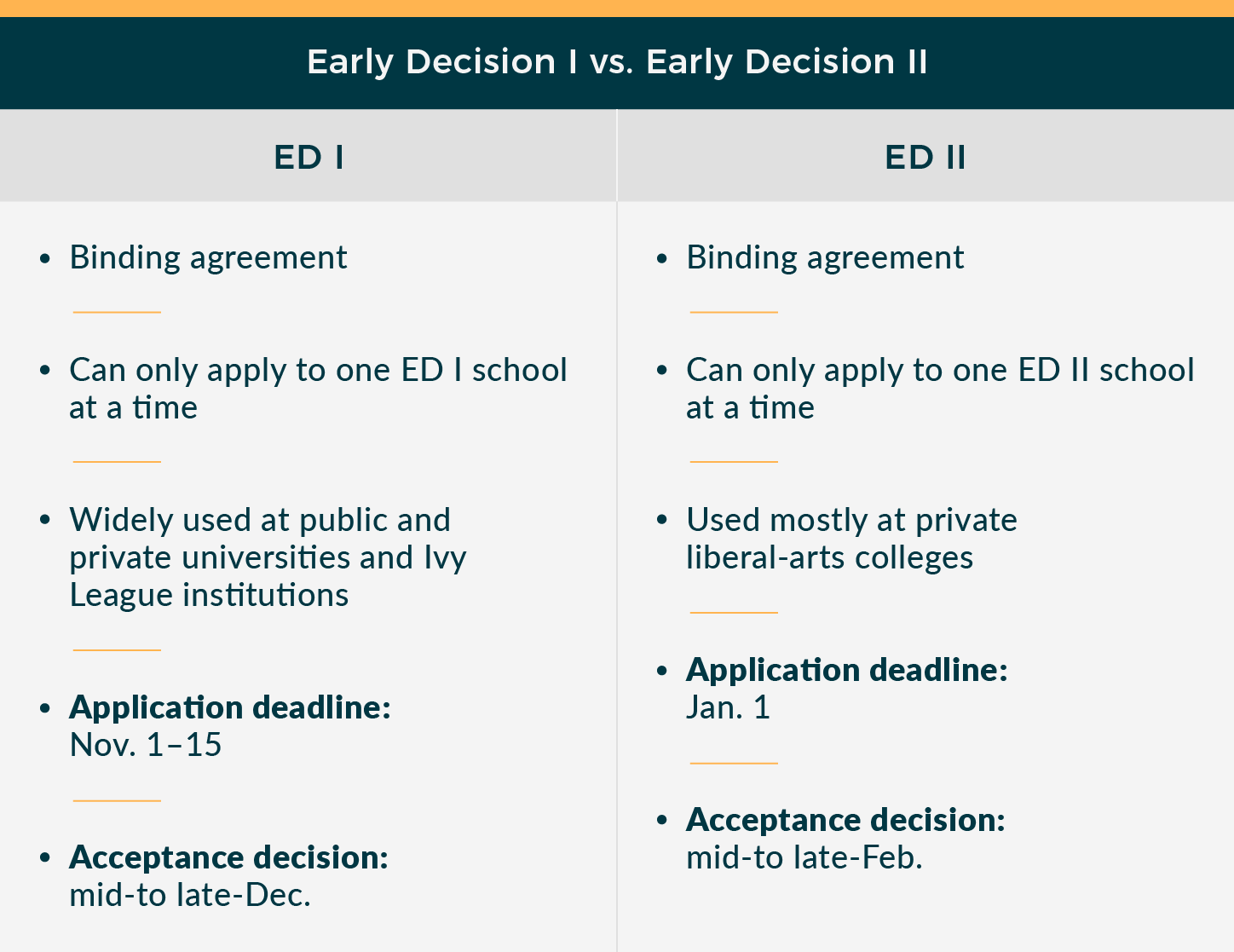
Advantages of Applying Early Decision
Much like early action, applying to college early decision has a number of advantages.
1. Early Application, Early Review, Early Decision
Much like early action, this is the major perk of applying early to any university. With early decision applications being due sometime between November 1 and 15, you’re getting ahead of your peers applying regular decision.
As with early action, your application is reviewed before the regular decision pool. If applicants have a strong application and meet all of the admissions criteria, their early application could very well help them get accepted early. In most cases, getting your application in ahead of your peers can only help you, especially when applying early decision.
In addition to being reviewed earlier than your peers, applying early decision can also be attractive to admissions staff. College admissions staff want as many accepted students to attend as possible. Considering that early decision applicants are entered into a binding agreement with the school, it can be attractive to show you’re serious about attending their university and are prioritizing their school over other options.
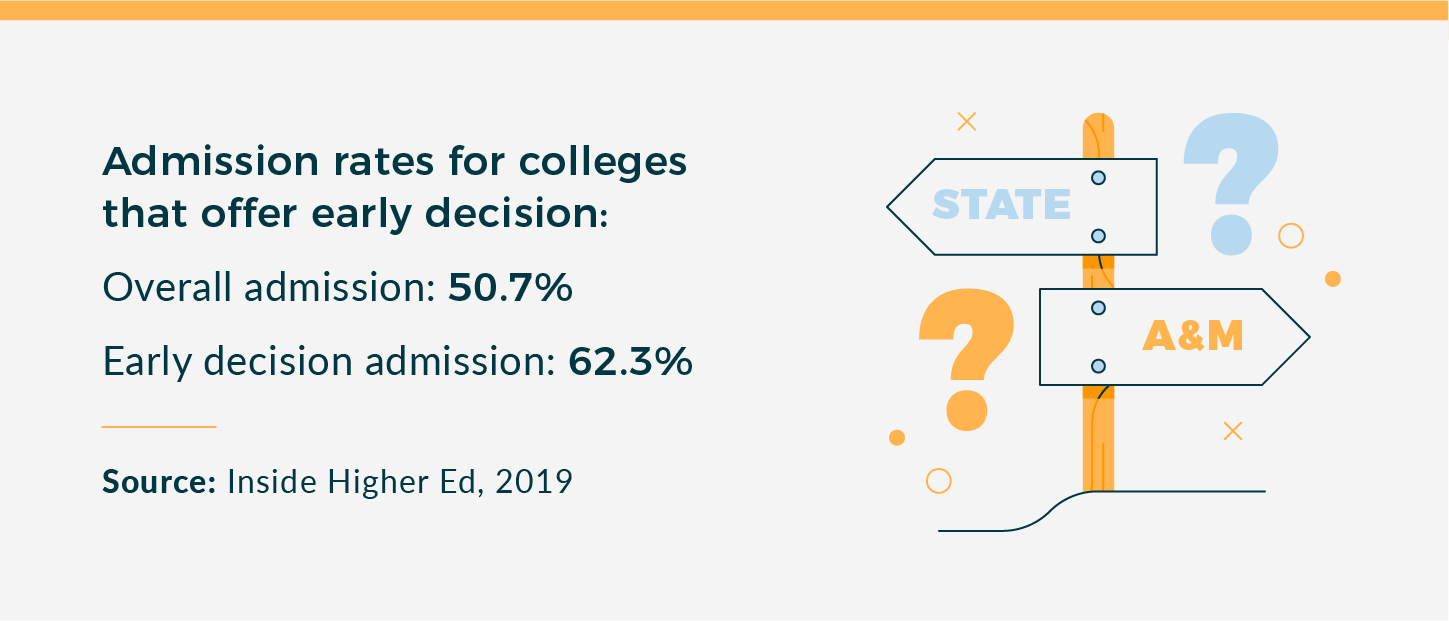
2. Fewer Decisions
One of the major advantages of early decision applications is that, if accepted, the decision of where to attend college is practically made for you. Once acceptances are mailed out for early decision applicants in December or January, you can know that the often arduous college admissions process is over for you! You can sit back and dream of the next four years at your university while your peers stress over the decision of where to attend.
Of course, sometimes life happens and the school you thought you only wanted to apply to turns out to not be the best option. If this is the case and you need to revoke your early decision, you should contact the school — but you might need to be prepared to pay to forfeit your spot.
Disadvantages of Early Decision
If accepted, having the decision of where to attend college made for you makes the application process much less stressful. However, there are some disadvantages that come with early decision college applications.
1. Little Flexibility for Change
Life happens, and sometimes people need to make decisions they didn’t foresee having to make. This can happen with early decision applications, and accepted students may need to back out of their contract.
Many colleges and universities are understanding of this having to happen from time to time “with good reason.” This could include a sudden health emergency, unforeseen circumstances like a death in the family or a lack of financial aid coming through to help subsidize the cost of college.
If any of these or other valid reasons come up after your acceptance, many schools are understanding of your need to back out. Many schools have you put a deposit down with an early decision application so your spot is automatically held for you, and backing out may mean you don’t get your deposit refunded.
However, if you don’t have a valid reason — for instance, if you’ve changed your mind, applied regular decision somewhere else and would rather attend there or any other reason your school doesn’t deem valid — you and your high school could be penalized beyond losing your deposit. This could look like other applicants from your high school being turned down, or even your high school being blacklisted by the university because of your decision.
2. All Your Eggs Are in One Basket
Having a number one school in mind is helpful for motivating you to do your best to get in. However, what happens if you put all your time and effort into one school and don’t get in?
Rejections happen, and they can be disheartening — especially if this was the only school you wanted to attend. This could even hurt your chances in more ways than one, because if you don’t hear back from your early decision school until December, you’ll be left scrambling to get applications in to other schools. This might lead to your applications not being as strong as they could be, which could lead to more rejections down the road.
Is early action better than early decision?
Schools with an early-choice program typically have fewer rejections of applicants as opposed to the total applicant pool. Early decisions are more important to college programs than early actions, because they help them determine the number of successful applicants who will enroll into college.
Who Should Apply Early Decision?
Early decision is the better option for some people, just like early action. Early decision is best suited for students who:
- Have researched colleges and universities extensively
- Are confident in their first college choice and wouldn’t want to apply elsewhere
- Matches or exceeds the college’s admissions profile in terms of grades, standardized test scores and academic performance
- Are academically and socially compatible with the university
Here are three three student personas who early decision applications are best for.
Early Decision for Online Colleges
Applying early decision at an online college looks very similar to applying early decision to a residential school. Applicants should conduct in-depth research beforehand to ensure they’re a good fit for the school academically, as well as review the school’s minimum requirements to ensure they meet (or exceed) them. Since this may be the only school applicants apply to, they should take extra consideration and care to ensure that their application is as strong as it can be to improve their chances of being accepted early.
Though you can’t visit the school itself to get a feel for the campus and academics before or after applying, many online schools offer digital tours that give prospective students a glance into how their virtual classrooms operate. This often includes in-depth explanations of how their distance learning procedures work, and could feature interviews with alumni and teachers or viewing a previously recorded lecture to get a feel for how attending college online at that school will feel.
Regular Decision Applications

While early action and early decision applications have earlier due dates and response times, regular decision college applications remain the standard process of applying to college.
Regular decision applicants generally have until January 1 to submit their applications, and will hear back regarding their acceptance or rejection by April 1.
Advantages of Applying Regular Decision
Just like applying early is the best fit for some people, applying regular decision is best for others. While it doesn’t come with the same perks as applying early, there are still a number of advantages to applying with regular admission plans.
1. Can Apply to Any Number of Schools
Regular decision applications do not have the limitations that ED applicants do, and an applicant applying regular decision can apply to any number of schools they please. Whether this is two or 15, when applying regular decision, the choice is yours.
2. More Time to Build a Great Application
If you’re a student who wanted or needed to retake your SAT, needed a little more time with your essay or just wanted more time to perfect your application, then regular decision is the best college application for you. Not applying early is a totally valid choice when you need more time to boost your application, increase your chances of getting in or apply for scholarships and a financial aid package.
In some cases, colleges who are debating whether to accept you or add you to the waitlist will request more information to see if your senior year performance helps you get in. This could include an additional letter of recommendation, updated grades, your improved test scores or more. In this case, waiting to apply is actually beneficial, and may help you get accepted.
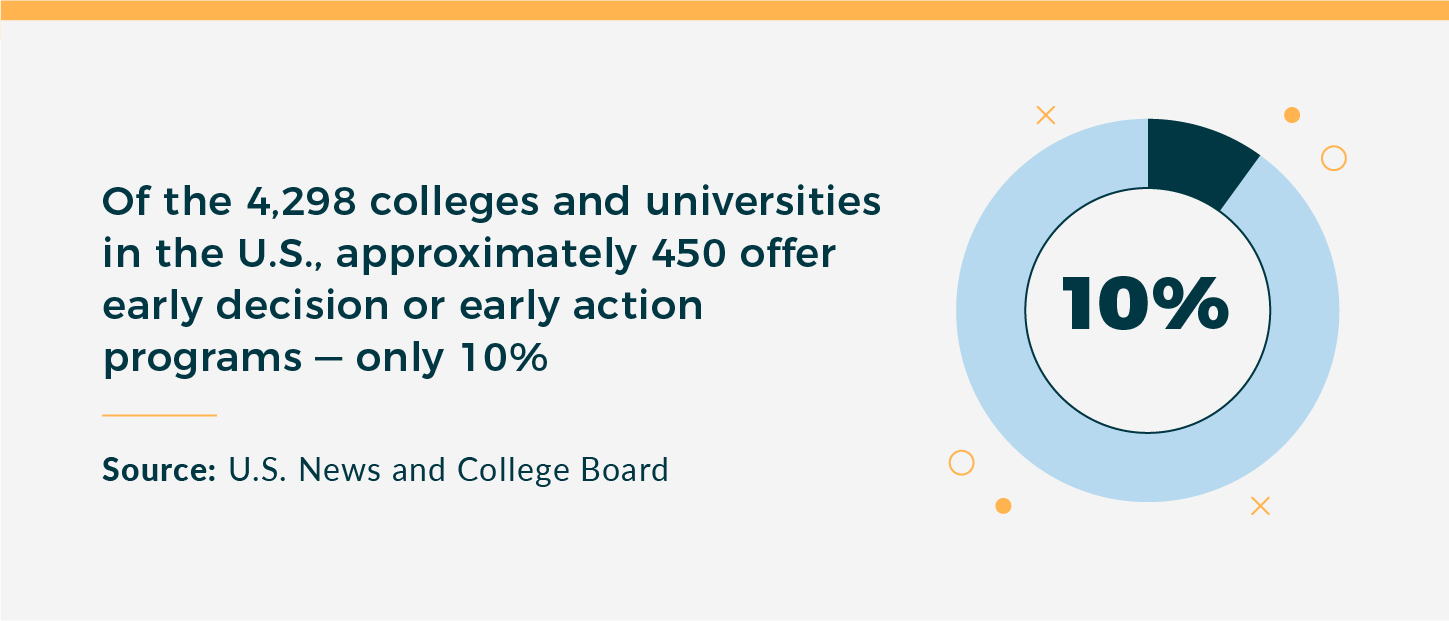
Who Should Apply Regular Decision?
When deciding whether to apply early or regular, knowing who the regular decision application is best for can help in making that decision. Regular decision is the best path forward for students who:
- Need more time to complete a more competitive application
- Are uninterested in or have not extensively researched colleges
- Would otherwise be rushing or submitting a subpar application
Whether you choose to apply early action to have more time to decide, early decision to have a binding agreement made for you or regular decision, make sure you’re making the most informed decision of the best application method for you. Applying for residential or online college is a huge undertaking, so be sure you’re making the best choices for you and your lifestyle! Put your best foot forward!
Sources: Vanderbilt Admissions | CNBC | College Vine | Princeton Review | Great College Advice | Peterson’s | Inside Higher Ed | College Greenlight | College Board Education Professionals | U.S. News & World Report





